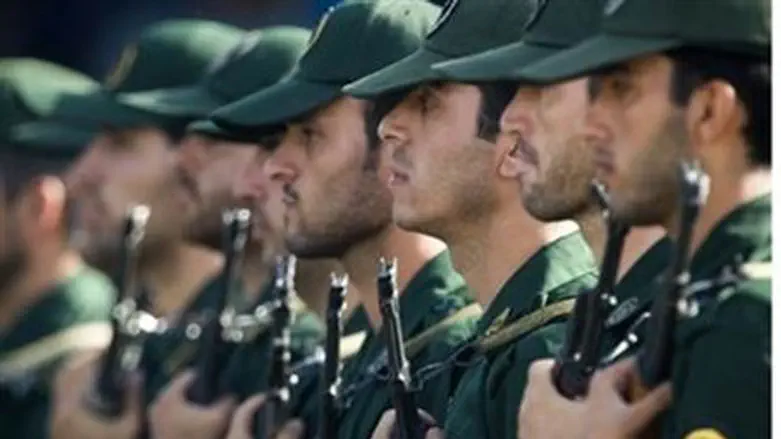
A covert cell operating under the Iranian government is fueling the bloodshed throughout the Middle East and North Africa, Fox News revealed Thursday.
Unit 190, a secret arm of the Iranian Revolutionary Guard's Quds Force made up of about two-dozen employees, has for years smuggled arms to these conflict zones, the network said.
After an extensive investigation tracing the land, air and sea routes used by the Quds Force to move weapons to Hezbollah, Hamas and now the Houthis in Yemen, Fox News has also learned from western intelligence sources the name of the Iranian man who is a key player in Unit 190: Behnam Shahariyari, born in 1968 in Ardabil, northwest Iran.
Western intelligence sources who spoke to the network said Shahariyari runs a network of straw companies which skirt sanctions and pack RPG's, night-vision equipment and long-range rockets in powdered milk, cement and spare vehicle parts.
“Very often arms and explosives were placed in trucks underneath legal cargo in order to hide them,” said Michael Eisenstadt, director of Military and Security Studies programs for the Washington Institute for Near East Policy.
In May 2007, when Turkey intercepted containers filled with 122mm mortar shells and explosives destined for Hezbollah via Syria in violation of UN Security Council Resolution 1747, the bill of lading had Shahariyari's signature on it.
A hangar in the civilian section of the international airport in Tehran near the Iran Air terminal reportedly serves as a warehouse for Unit 190, according to western intelligence sources who provided Fox News with a photo of the hangar.
In fact, the U.S. Treasury has sanctioned front companies used by the Quds Force’s Unit 190 to transport weapons to Hezbollah, and other terrorist groups in the Middle East, in direct violation of UN Security Council resolutions.
“Many times when you see the United States government imposing sanctions on so-called ‘commercial businesses’ in Iran, it's in reality the Quds Force that they are trying to sanction,” Ali Alfoneh, an Iranian-born political scientist at the Foundation for the Defense of Democracies, told Fox News.
“There are several major Iranian islands in the Persian Gulf region which serve as shipping points for Iran's armed transportation to the region,” he added.
More recently, in January 2013, the U.S. Navy intercepted 40 tons of anti-tank and anti-aircraft missiles on board a boat named the Jeehan-1, weapons that western intelligence officials say were destined for the Houthis.
“We know that there is a relationship between the Houthis and Tehran,” Pentagon Press Secretary Rear Adm. John Kirby told reporters on Tuesday. “We've been very clear on multiple occasions about our concerns about the tentacles that Iran has throughout the region, specifically with support to groups and organizations that aren't doing anything to increase stability in the region.”
In October 2012, explosions rocked the Sudanese capital, Khartoum. Video from that night shows the factory in the southwest part of Sudan's capital where Iran stored the weapons that intelligence officials say they planned to distribute overland through Egypt into Gaza and elsewhere across the Middle East.
Sudan has blamed Israel for the explosion. Israel refused all comment on Sudan's accusation about the factory blast, though a top Israeli defense official said Sudan "serves as a route for the transfer, via Egyptian territory, of Iranian weapons to Hamas and Islamic Jihad terrorists."
“Apparently, that was a compound that was probably used as a transshipment point,” Eisenstadt told Fox News.
“The Iranians would bring in arms from Iran to Port Sudan and they would bring the arms to this transshipment point awaiting re-transport over land to Gaza or to other points in Africa.”
Israel has several times intercepted Iranian arms shipments: in March 2014 the Israeli navy stopped a commercial ship called the Klos-C which was filled with Syrian long range rockets.
In March 2011, it intercepted the Victoria with Iranian C-704 shore-to-sea missiles onboard, reportedly destined for Gaza.
In October 2010, Nigerian security forces arrested Quds Force activists in Nigeria after intercepting a shipment of mortar shells and rockets destined for Gambia, noted Fox News.
In January 2009, the USS Farragut helped intercept in the Red Sea a former Russian ship filled with explosives that originated in Iran. It was escorted to Cyprus, where the contents of the cargo later exploded, killing a senior officer in the Cypriot Navy and leaving a 600 yard wide crater.
In November 2009, Israel intercepted the Francop, a vessel with 500 tons of weapons onboard.
